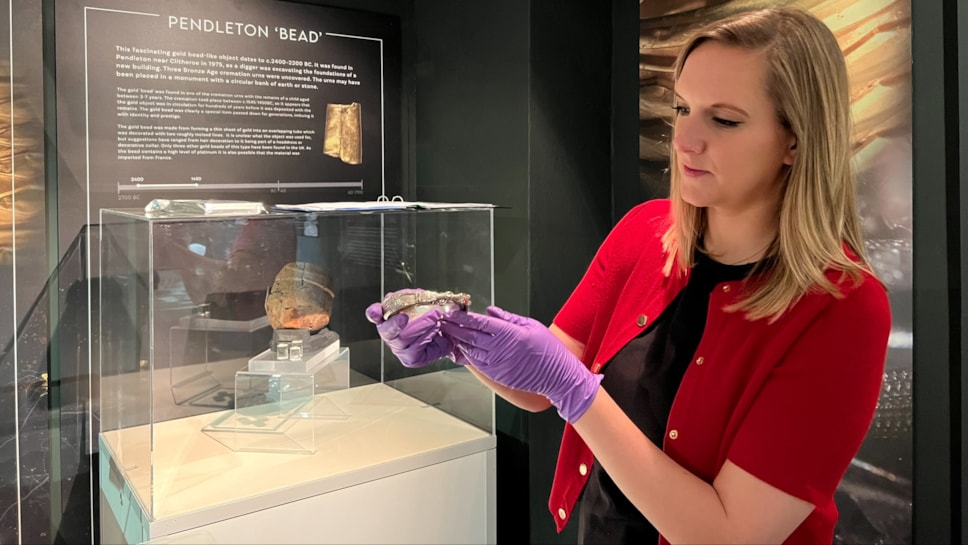
Archaeology Festival and spellbinding exhibition to give fascinating glimpses of the past
A rare chance to delve into Lancashire's past and view historic hidden gems is on offer at a captivating festival and exhibition this week.
The popular 'Festival of Archaeology' is offering an exciting array of family friendly events, workshops and activities until 31 July at Clitheroe Castle Museum.
Now in its fourth year and linked to the Council for British Archaeology's national festival, the Festival of Archaeology in Clitheroe will involve fascinating talks, tours, workshops and technologies.
Highlights include a captivating workshop and talk on Neolithic Pottery, held on 15 July with expert Dr Rick Peterson from the University of Lancashire, as well as an Archaeology Festival and Community Hub Day on Saturday, 19 July.
This will be when local archaeologists and experts will be on hand to answer questions and share their knowledge, along with Portable Antiquities Lancashire and Cumbria, to examine any artefacts.
The Festival of Archaeology runs at the same time as a rare exhibition called 'Hidden Hoards,' which opened to the public on 11 July, featuring objects from the Early Bronze Age to Tudor Lancashire.
'The Silverdale hoard' found near the village in 2011
These include Roman and Viking treasure, lost Tudor savings and misplaced Roman gemstones, discovered through archaeological excavation and metal detectors. The Viking treasure, known as 'the Silverdale hoard,' consists of pieces of silver such as jewellery, coins and ingots, discovered near the village back in 2011.
Sarah Austin, curator at Lancashire County Council's Cultural Services, said:
"The Silverdale hoard was buried between 900 and 910AD. It was found in the original lead container it was buried in. Some of the ingots have nicks marks, where Viking traders were checking for purity.
"There are also silver coins from the Islamic world known as Dirhams amongst the hoard. One coin came all the way from Baghdad on a Viking age ship, which really gives you a sense of the scale of the network of trade into Lancashire as part of the trade along the Silk Road."
Also featuring in the 'Hidden Hoards' exhibition, which runs until March next year, will be a collection of Roman silver coins, known as the 'Waddington Hoard,' a lost Tudor purse, a misplaced thimble and some lost Roman gemstones.
The Whalley silver thimble dating back to the 17th century
"The Waddington Hoard consists of 30 silver denarii which were found buried in a pottery bowl near Waddington." said Sarah. "They were probably someone's savings buried in the second century AD. Roman army veterans were sometimes given land to farm on their retirement, so it's possible that they belonged to a Roman army veteran who was farming out near Waddington. The last coin was from the time of the Emperor Hadrian."
Meanwhile a silver thimble from the 17th Century found in Whalley will also feature, she added, along with some lost coins from the 1590s found in Barton near Preston which could have been lost by accident.
Sarah added:
"Thimbles were often given as gifts to women by suitors or by their family, and this one has the initials AN on the top, which could be the maker's mark, or could be the initials of the woman it was given to. Perhaps this woman was walking through Whalley in the 1600s and dropped it by mistake."
Additional historic items that can be viewed at the exhibition include some Roman gemstones, found during excavations at the Roman bathhouse at Ribchester.
Ribchester Intaglios, gemstones found during excavations of the Roman bathhouse in Ribchester
Sarah said:
"The heat of the baths sometimes melted the glue that adhered these gemstones to rings, which is why are found in large numbers in Roman bathhouse drains! The gemstones on display belonged to people that had had a bad day at the bathhouse!"
The Festival of Archaeology takes place until 31 July and the 'Hidden Hoards' exhibition runs until March 2026.
Both are happening at Clitheroe Castle Museum, with many Festival of Archaeology events accessible for free. Admission to Clitheroe Castle Museum costs £5.10, but everyone under 18 goes free.
Silver coins from the 'Mitton Hoard,' medieval coins discovered in Great Mitton in 2006
County Councillor Matthew Salter, cabinet member for Education and Skills, said:
"I'm pleased Lancashire are part of this national celebration of our history and heritage. There are remarkable archaeological sites in Lancashire and these exhibits bring to life the Lancastrians of times gone by.
"I want to encourage everyone to visit Clitheroe castle and discover the archaeology and heritage, and hope that the next generation of archaeologists and historians will be inspired by what they see."
- To find out more about the 'Festival of Archaeology, as well as the 'Hidden Hoards' exhibition, visit Clitheroe Castle Museum's website http://tiny.cc/ClitheroeCastleMuseum or contact the museum by telephoning 01200 424568 or emailing clitheroecastle@lancashire.gov.uk.
- Clitheroe Castle Museum is managed by Lancashire County Council's Museum Service on behalf of Ribble Valley Borough Council.
- For more information on Lancashire Museums this summer, take a look at our website. And to find out more about what's on offer this #LancsSummer, check out our #LancsSummer website at https://www.lancashire.gov.uk/summer/
Notes to editors
- Lancashire County Museum Service hosts the Portable Antiquities Scheme in partnership with the British Museum supporting metal detectorists and recording finds from across the north-west.
- Upcoming events at the Festival of Archaeology at Clitheroe Castle Museum are:
19 July 11am-3pm Archaeology Hub Day: Meet local archaeologists and
experts.
19 July 1.00pm Build Your Own Neolithic House: Special Craft Activity
19 July 11.30am History Beneath Your Feet: Clitheroe Castle Archaeology Tour
23 July 11.30am & 31 July 1.30pm Junior Archaeologist: Medieval Tile Workshop
23 July 1.30pm & 31 July 11.30am Junior Archaeologist: Neolithic Pottery Workshop
24 & 30 July, 11.30am & 1.30pm Junior Archaeologist: Dig Pits
26 July 11am-1pm & 2pm-4pm Armchair Archaeology — with Ribble Valley Archaeology
- The Council for British Archaeology (CBA)
This is a leading educational charity dedicated to championing and promoting engagement in archaeology and supporting grassroots archaeologists across the UK. The CBA Festival of Archaeology incorporates hundreds of in-person and virtual events delivered by community groups, heritage organisations, universities, commercial units, and more. For more information visit https://www.archaeologyuk.org/




